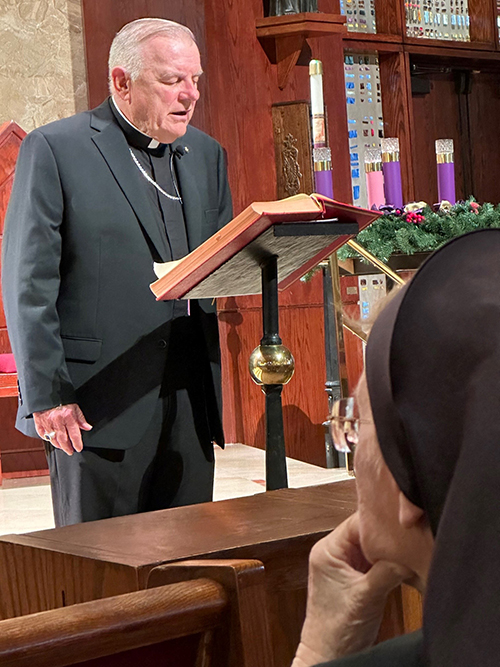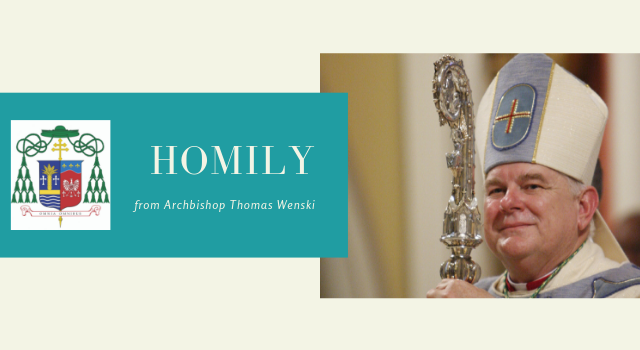By Archbishop Thomas Wenski - The Archdiocese of Miami
Archbishop Thomas Wenski delivered this Advent reflection to the staff of the Pastoral Center the morning of Nov. 30, 2022. The reflection was followed by an opportunity for private prayer and confession and concluded with a Mass, also celebrated by the archbishop.
Well, it is Advent.
A new liturgical year has begun: the Church marks the passage of time with the celebration of the main events in the life of Jesus and the story of salvation. As Mother, the Church illuminates the path of our existence, supports us in our daily occupations and guides us towards the final encounter with Christ.
And so, perhaps we could begin our Advent Reflection with an ancient Advent prayer, a prayer with which the New Testament revelation ends: Marana tha! Come, Lord Jesus!
Advent should be a time to take a spiritual inventory – to ask ourselves those hard questions about the extent our hearts are unredeemed and thus in need of the coming of Christ.

Photographer: ANA RODRIGUEZ-SOTO | FC
Archbsihop Thomas Wenski delivers the annual Advent reflection for Pastoral Center employees, Nov. 20, 2022 in St. Martha Church, which is located next door to the archdiocesan offices.
So, the questions we must ask this Advent might include: How much of my heart truly belongs to Christ? How have I been self-sufficient instead of asking for and surrendering to God’s grace? Where in my life do I need God to enter my “weakness and wretchedness” and transform it with his strength?
Advent, with its warning that we be “watchful,” can help us avoid making the one great mistake in life: getting absorbed in a thousand things and not to notice God.
Drawn by our own interests ... and distracted by so many vain things, we risk losing sight of what is essential. Thus, the byword of the Advent Season is: Keep watch and stay awake.
You might remember the movie, Groundhog Day. The star woke up – and still found himself caught in time, each day repeating what he did the day before. And once he realized that he was trapped in time his life became one of sad desperation.
Many religions of the world present life in somewhat the same fashion – that it is just one big cycle – always going back to the beginning as it were.
Today, we begin – as we do every year at this time – a new liturgical cycle. And the liturgical cycles somewhat correspond to the seasons of the year – depending on where you live of course. During the winter we are reminded of the shortness of life, that we will grow old and die, and so Advent speaks to us of our need to be ready to greet the Lord. Later, at springtime, when we see a rebirth in nature, the liturgy celebrates our new birth in the Resurrection of Jesus Christ.
However, our Christian religion – like the other two religions that claim Abraham as their father in faith, Judaism, and Islam – does not see life as some sort of endless cycle. God puts us on this earth – but this earth is not a treadmill but a highway. Our earthly life has a purpose; our earthly life has a destination.
Those of us, who are over 60, if we studied our Baltimore Catechism well, learned this early on. Who made us? God made us. Why did God make us? God made us to know him, to serve him, to love him in this life so as to be happy with him forever in the next. The purpose of our lives on earth is to get to heaven; the destination that awaits us is God himself.
All of us, had we absorbed this lesson well and applied it to our lives, would have avoided much anxiety, much of the sad desperation that so often characterizes life lived in this “vale of tears.” During this season of Advent, we are given a “wake-up” call so that instead of running in place we get back on the track of what life on this earth is supposed to be about: namely, knowing the Lord, serving the Lord, and loving the Lord in the hope of living with the Lord for all eternity in heaven.
We live in a society of instant gratification – which is probably why the stores are already filled with carols and Christmas trees. The Church, however, marches to a different tune. We put on purple vestments, we don’t sing the Gloria. The wake-up call, which is the Advent Season, calls us to penance, to conversion of heart. During this season of Advent, all of us should approach the confessional, if only to remind us that Jesus is the reason for the season. Without acknowledging that we are not as self-sufficient, as autonomous as we sometimes pretend; without recognizing the false turns we have made, the sinful choices that turn us away from the destiny to which he calls us, God will be not only “missing” from our lives; he will not even be “missed.” How can we welcome the one who comes to save us, if we don’t acknowledge our need to be saved?
“Stay awake,” Jesus tells us in Sunday’s Gospel. “As it was in the days of Noah, so it will be at the coming of the Son of Man.”
That vigilance demands we distinguish ourselves from the routine of a world that doesn’t hope for anything more than the here and now. In such a world people go about their normal routines – eating and drinking, marrying, and giving in marriage, working in the field, and grinding at the mill – without any awareness of God, or God’s purpose for them, in their lives. Life in this way, as St. Paul told us in the second reading, is “the works of darkness.” Advent calls us to reorient ourselves towards “the dawning light.”
This doesn’t mean we stop everything and just sit there. Advent tells us to get off the treadmill; but at the same time, it tells us to get moving – along the highway where the Lord is coming to meet us.
So, in that second reading, St. Paul doesn’t devalue the activities that make up our daily lives, but he tells us to live these activities “in the light of eternity.” So, while eating and drinking continues, “not carousing and drunkenness”; marriage continues, but without “sexual excess and lust”; work in the fields and mills remains but “without quarreling and jealousy.”
This is how Advent invites us to make straight the path to the Lord.
Advent as our annual “wake-up” call reminds us of our eternal destination – that we were made by God, and for God. We have to get off the treadmill of our lives and move in a purposeful direction through these weeks of penance and prayers towards the Christmas feast. Otherwise, we risk succumbing to the dangers of mediocrity, lukewarmness, and indifference in our Christian life.
Without making an effort to love God daily and awaiting the newness he constantly brings, we easily become mediocre, lukewarm, worldly – and this is what eats away and erodes our faith. Pope Francis says that “faith is the very opposite of mediocrity: it is an ardent desire for God, a bold effort to change, the courage to love, constant progress." Faith is not water that extinguishes flames, it is fire that burns; it is not a tranquilizer for people under stress, it is a love story for people in love.
And as Jesus hints at in the Gospel, God will surprise us.
God surprises us with the Good News, the glad tidings announced by angelic choirs: that he who makes himself our destination, has made us his destination: for he who would come at an hour we did not expect, also came in a way we did not expect.
The Word became flesh and made his dwelling among us.
Along with our pre-holiday shopping and partying, we should all make time to go to confession if only to remind ourselves that Jesus is, after all, the reason for the season. Most of our parishes have scheduled extra time for confessions; many have communal reconciliation services (with individual confession and absolution). By taking advantage of these opportunities for the Sacrament of Penance, we can, in the words of John the Baptist, “prepare the Way of the Lord.” A good confession can bring Christ to birth once again in our lives – a good confession undoes the “noes” of our sins and reaffirms the “yes” of our baptism. Christmas means that Jesus still offers us gentle miracles of healing, of reconciliation, of interior peace and consolation, if only we approach him with trusting faith.
Such trusting faith is perfectly modeled in the sinless Virgin Mary whose “yes” to God’s will allowed the Word to take flesh in her womb. She became the true “dwelling place” of the Lord, a true “temple” in the world and a “door” through which the Lord entered upon the earth. Advent reminds us that Christ wants to come to us – and, through us, he wants to come and live in our world. Between his first coming as man, when he was born of the Virgin Mary, and his final coming in glory at the end of time, he continues to come among us and knocks at the door of our hearts asking us: Are you willing to give me your flesh, your time, your life?
We cry out in hope: Marana tha! Come, Lord Jesus!

